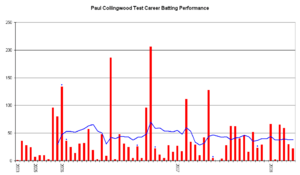Paul Collingwood facts for kids
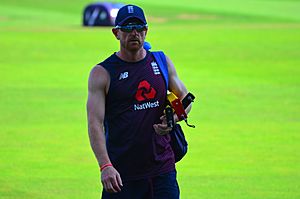
Collingwood in 2019
|
||||||||||||||||||||||||||||||||||||||||||||||||||||||||||||||||||
| Personal information | ||||||||||||||||||||||||||||||||||||||||||||||||||||||||||||||||||
|---|---|---|---|---|---|---|---|---|---|---|---|---|---|---|---|---|---|---|---|---|---|---|---|---|---|---|---|---|---|---|---|---|---|---|---|---|---|---|---|---|---|---|---|---|---|---|---|---|---|---|---|---|---|---|---|---|---|---|---|---|---|---|---|---|---|---|
| Full name |
Paul David Collingwood
|
|||||||||||||||||||||||||||||||||||||||||||||||||||||||||||||||||
| Born | 26 May 1976 Shotley Bridge, County Durham, England |
|||||||||||||||||||||||||||||||||||||||||||||||||||||||||||||||||
| Nickname | Colly, Brigadier Block | |||||||||||||||||||||||||||||||||||||||||||||||||||||||||||||||||
| Height | 5 ft 11 in (1.80 m) | |||||||||||||||||||||||||||||||||||||||||||||||||||||||||||||||||
| Batting | Right-handed | |||||||||||||||||||||||||||||||||||||||||||||||||||||||||||||||||
| Bowling | Right-arm medium | |||||||||||||||||||||||||||||||||||||||||||||||||||||||||||||||||
| Role | All-rounder | |||||||||||||||||||||||||||||||||||||||||||||||||||||||||||||||||
| International information | ||||||||||||||||||||||||||||||||||||||||||||||||||||||||||||||||||
| National side |
|
|||||||||||||||||||||||||||||||||||||||||||||||||||||||||||||||||
| Test debut (cap 622) | 2 December 2003 v Sri Lanka | |||||||||||||||||||||||||||||||||||||||||||||||||||||||||||||||||
| Last Test | 3 January 2011 v Australia | |||||||||||||||||||||||||||||||||||||||||||||||||||||||||||||||||
| ODI debut (cap 162) | 7 June 2001 v Pakistan | |||||||||||||||||||||||||||||||||||||||||||||||||||||||||||||||||
| Last ODI | 11 March 2011 v Bangladesh | |||||||||||||||||||||||||||||||||||||||||||||||||||||||||||||||||
| ODI shirt no. | 5 (previously 50) | |||||||||||||||||||||||||||||||||||||||||||||||||||||||||||||||||
| T20I debut (cap 1) | 13 June 2005 v Australia | |||||||||||||||||||||||||||||||||||||||||||||||||||||||||||||||||
| Last T20I | 13 September 2017 v Pakistan | |||||||||||||||||||||||||||||||||||||||||||||||||||||||||||||||||
| T20I shirt no. | 5 | |||||||||||||||||||||||||||||||||||||||||||||||||||||||||||||||||
| Domestic team information | ||||||||||||||||||||||||||||||||||||||||||||||||||||||||||||||||||
| Years | Team | |||||||||||||||||||||||||||||||||||||||||||||||||||||||||||||||||
| 1995–2018 | Durham (squad no. 5) | |||||||||||||||||||||||||||||||||||||||||||||||||||||||||||||||||
| 2009–2010 | Delhi Daredevils (squad no. 5) | |||||||||||||||||||||||||||||||||||||||||||||||||||||||||||||||||
| 2011–2012 | Perth Scorchers | |||||||||||||||||||||||||||||||||||||||||||||||||||||||||||||||||
| 2012 | Impi | |||||||||||||||||||||||||||||||||||||||||||||||||||||||||||||||||
| Career statistics | ||||||||||||||||||||||||||||||||||||||||||||||||||||||||||||||||||
|
||||||||||||||||||||||||||||||||||||||||||||||||||||||||||||||||||
|
Source: ESPNcricinfo, 27 September 2018
|
||||||||||||||||||||||||||||||||||||||||||||||||||||||||||||||||||
Paul David Collingwood, born on May 26, 1976, is a famous English cricket coach and former player. He played for the England in all three types of international cricket games. He also played for his local team, Durham County Cricket Club.
Collingwood was a regular player in England's Test team. He also became the captain of the One Day International (ODI) team from 2007 to 2008. He was the very first captain for England's T20I team. As captain, he led England to win their first major trophy, the 2010 World Twenty20. He even scored the winning run in the final match!
He captained his county club, Durham, for the last six years of his playing career. Collingwood was an all-rounder, meaning he was good at both batting and bowling. He was known for his strong batting and also bowled reliable medium-pace deliveries. People called him a "natural athlete" and one of the best fielders of his time. He often fielded in key positions like backward point.
Collingwood started playing first-class cricket in 1996. He first played for England in One Day International cricket in 2001. His Test match debut was in 2003. For a couple of years, he played Test matches only sometimes. But after being chosen for the last Test of the 2005 Ashes series, he became a regular player.
In the 2006–07 Ashes, he scored 206 runs. This was the first time an England batsman scored a double century in Australia in 78 years. He also had three amazing performances at the end of the 2006–07 Commonwealth Bank Series in Australia. These helped England win the trophy and made him very popular in the media.
He announced he was retiring from Test cricket in January 2011. This was during the fifth Test of the 2010–11 Ashes series. He ended his Test career on a high note, winning the Ashes three times. England won a series in Australia for the first time in 24 years. He retired from first-class and List A cricket in September 2018.
After he stopped playing, Collingwood became a coach. He worked with Scotland and Durham CCC. In 2014, he joined the England Cricket Team as a coach for limited-overs games and fielding. In February 2022, he became the temporary head coach for the men's England cricket team.
Contents
Early Life and Family
Paul Collingwood grew up in Shotley Bridge, a town near Consett in County Durham, England. His parents are David and Janet, and he has an older brother named Peter. He went to Blackfyne Comprehensive School, which is now called Consett Academy.
He started playing cricket on the school fields. At just nine years old, he was good enough to join Shotley Bridge's Under-13s team. When he was a teenager, his father, who is still a member of the Shotley Bridge Cricket Club, convinced him to focus on cricket instead of football. Collingwood still visits his old club often. He is seen as a great role model for young players there.
He lives in Northumberland and has three daughters: Shannon (born 2006), Keira (born 2008), and Hannah Mae (born 2011). He is a big fan of the Sunderland AFC football team. His nicknames include 'Colly', 'Weed', 'Brigadier Block', and 'Shep'. 'Brigadier Block' was given to him because he was very good at playing defensive shots.
Playing for His County
Starting with Durham
Paul Collingwood joined Durham, his local team, in 1995. He first played in List A one-day matches. When Durham first noticed him, they thought he was mainly a bowler who could also bat a little. His coach, Geoff Cook, said in 2006 that Collingwood's strong will, more than his natural talent, made him stand out.
Cook explained that Paul had talent, but not more than other young players. Paul had bad luck with a back injury and missed a lot of games. A less determined person might have quit. But Paul came back and worked harder than ever. He couldn't bowl as much at first, so he focused on batting. Soon, his batting talent became clear. He quickly made it into the Under-19 team and then got a professional contract.
Early Career and Improvement
Collingwood played his first first-class match in 1996 against Northamptonshire. He made a great start by taking a wicket with his very first ball. He also scored 91 runs in his first batting turn. However, his early years were steady but not spectacular. From 1996 to 2000, his batting average was between 20 and 30. His bowling average was between 30 and 60.
His big improvement began in 2000. Durham members voted him Player of the Year, especially for his one-day games. After a back injury, his form varied. But in 2001, he played exceptionally well in both the County Championship and one-day games. From 2001, he had a batting average over 40 four times. His bowling average was under 40 three times.
To improve his skills, Collingwood played for Richmond Cricket Club in Australia during their 2000–01 season. He won the Jack Ryder Medal for the best player in the league. He was the first Richmond player to ever receive this award.
Durham became a first-class team in 1992. In 2006, they had their best performances in the league championships. In 2007, they won the Friends Provident Trophy. Collingwood scored 22 runs and took 3 wickets for 33 runs in the final. However, his England duties limited his play for Durham that year.
In 2005, Collingwood played in 13 County Championship matches. He scored 1103 runs and took 21 wickets. His batting average was 55.15 and his bowling average was 31.90. As a reward for his service, Durham gave Collingwood a "benefit year" in 2007. He used this to support two charities: Marie Curie Cancer Care and the Cricket Foundation's "Chance to Shine" project. This project helps teach cricket in schools.
Indian Premier League
When England players were allowed to join the Indian Premier League, Collingwood was signed by the Delhi Daredevils in 2009. He was bought for $275,000. In 2011, the Rajasthan Royals signed him for $250,000. However, he could not play in the 2011 season due to a knee injury. He got this injury during the World Cup.
International Career
England Debut
Collingwood's good form for Durham in 2001 led to him being called up for the England One Day International (ODI) team. He played in the NatWest Series against Pakistan and Australia that summer. He became the 162nd player to play for England in ODI cricket.
His first ODI match in June 2001 was not very successful. He scored only two runs and took no wickets against Pakistan. He also did not do well in the rest of the series. Despite this, the selectors trusted him. They chose him for the 2001–02 one-day tour of Zimbabwe. There, he took his first ODI wicket. He then scored a match-winning 77 runs in the Fourth ODI. He also made an unbeaten 56 in the final ODI, helping England win 5–0.
Collingwood played in all seven matches of the 2002 NatWest Series. He played against India and Sri Lanka. His batting and bowling were not very impressive in this series. But he scored his first ODI century in 2002/2003 against Sri Lanka. This performance secured his place in the England one-day team.
However, he dislocated his right shoulder in 2003 and missed most of the season. Still, he received an England contract. He made his Test debut against Sri Lanka in December 2003. This was because Nasser Hussain was sick. Collingwood became the 622nd Englishman to play Test cricket. In this game, he showed he was one of England's best fielders. He took five catches and made a run-out. His fielding skills have been compared to the famous South African fielder, Jonty Rhodes.
He kept his place in England's one-day team throughout 2004, despite a knee injury. He scored an unbeaten 79 against India. Collingwood was also England's second-highest run-scorer in the 2004 ICC Champions Trophy. He scored 141 runs, including an unbeaten 80. He was later named in the England Development Squad in May 2005.
Ashes 2005 Victory
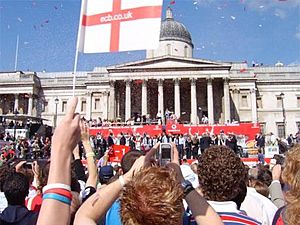
On June 21, 2005, Collingwood played for England against Bangladesh. He scored 112 runs without being out and then took six wickets for 31 runs. These were the best bowling figures ever by an Englishman in an ODI. This made Collingwood the first player to score a century and take six wickets in an ODI. This amazing performance was better than Viv Richards' previous record. He also made a stunning catch against Australia, which was called a "Classic catch" by BBC Sport.
Collingwood also played in England's first Twenty20 International match. He scored 49 runs and took two wickets. This helped England start their Ashes journey with a big win against Australia.
Collingwood was chosen for the Test squad for the 2005 Ashes series. He played in the Fifth Test when Simon Jones was injured. He scored only 7 and 10 runs in that match. But his defensive batting, along with Kevin Pietersen, helped England draw the match. This secured the Ashes for England for the first time since 1987. In 2006, Collingwood was awarded the MBE for his part in the Ashes victory.
Success in Pakistan and India
After the Ashes win in 2005, Collingwood toured with England to Pakistan and India in 2005–06. He played in the First Test against Pakistan in 2005. He scored only 13 runs and took no wickets. He was dropped for the Second Test but returned for the Third. He scored his first Test 50 and another in the second innings. England lost the series 2–0. In the ODI series, he and his Durham teammates took most of England's wickets.
Collingwood was called into the England team for the First Test against India in March 2006. This was due to injuries and illness to other players. He scored a magnificent 134 runs without being out in the first innings. This was his first Test century. He became the first Durham player to score a Test century for England. After this, a newspaper headline even joked, "MBE? Give this man a knighthood!"
Sri Lanka and Pakistan in 2006
Collingwood kept his place for the first three Tests against Sri Lanka in 2006. He scored an unbeaten half-century. In the Second Test, he took five catches. He also scored his second Test century against Pakistan later that summer. He scored 186 runs, which was England's highest score in that series.
Collingwood took his first Test wicket on August 6, 2006. He also bowled some off-spin, which surprised many. Later that summer, he played his 100th ODI match. He also reached 50 ODI wickets in the same game.
Ashes 2006/07
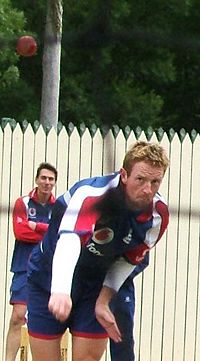
Collingwood was chosen for the 2006 2006 ICC Champions Trophy and Ashes tour. In the Second Test at Adelaide, Collingwood scored a career-best 206 runs. He shared a 310-run partnership with Pietersen. He became only the eighth English player to score a double century against Australia in Ashes history. He was the first to do so in Australia since 1929.
Despite England losing the series 5–0, Collingwood finished as the 14th best Test batsman in the world. The Commonwealth Bank One-Day International Series started slowly for Collingwood. But he returned to form, scoring 106 runs and taking two wickets in a key win against New Zealand. He then scored a century and the winning runs against Australia in the first final. His 120 runs without being out was the highest ever by an English ODI player against Australia in Australia. He was named Man of the Match for three games in a row.
World Cup 2007
Collingwood and the English team arrived in the Caribbean for the 2007 Cricket World Cup with high hopes. However, their performances were not strong. They lost to New Zealand and had unimpressive wins against Ireland and Bangladesh. They also lost heavily to Australia and South Africa. This meant they were out of the tournament.
Collingwood did not score many runs in the tournament. However, he was the joint top fielder, taking eight catches. He made a stunning catch to dismiss Devon Smith against the West Indies.
2007 Season
Collingwood scored 111 runs in the first home Test at Lord's against the West Indies. He was one of five Englishmen to score centuries in the same match at Lord's. This was a first! He then scored his second century of the series at Durham's home ground, Riverside. He hit 128 runs.
After his good form, Collingwood was named captain of the England team for the Twenty20 and One-Day International games against the West Indies. England drew the Twenty20 series. Collingwood scored 79 runs in one match. England then won the first ODI match under his captaincy. They also won the closely fought ODI series against India 4–3.
Collingwood led England to victory over Zimbabwe in the group stages of the 2007 Twenty20 World Championship. However, England was later defeated by other teams and exited the competition. During England's tour of Sri Lanka, Collingwood led the team to victory in the ODI Series.
2008 Season
Collingwood had a good Test series in New Zealand in early 2008. He scored 244 runs in three matches, passing 50 three times. His ODI game was also successful. However, his home series was less successful. He scored only 32 runs in three matches.
His home ODI series had some controversy. He appealed for a run-out after an opponent collided with another player. This caused criticism. He was also banned for four limited-overs matches because England's bowling was too slow. Kevin Pietersen took over as captain.
Collingwood's poor form continued into the first Test against South Africa in July 2008. He scored only seven runs. He was left out of the next Test. But he was recalled for the third Test and scored a century. This gave England a chance to win the series.
Soon after, Collingwood stepped down as captain of the ODI team. He said it was affecting his enjoyment of the game. He wanted to have fun playing cricket again.
2009 Season
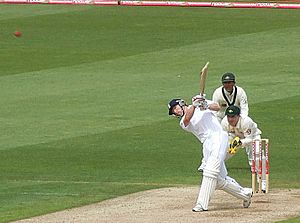
Collingwood filled in as England's wicket-keeper in May 2009 when Matt Prior was injured. He did well and enjoyed the experience. His form in the 2009 World Twenty20 tournament was not great. But his form in Test matches was at its best. He had scored three centuries in his last twelve innings before the 2009 Ashes.
In the first Test of the 2009 Ashes in Cardiff, Collingwood scored 64 runs. England seemed likely to lose, but Collingwood stayed at the crease for almost the whole final day. He scored 74 runs. The last two batsmen then blocked out the final overs, securing an amazing draw.
In the second Test at Lord's, Collingwood scored 54 runs. He helped other aggressive batsmen score quickly. England won the match. Collingwood also took two good catches.
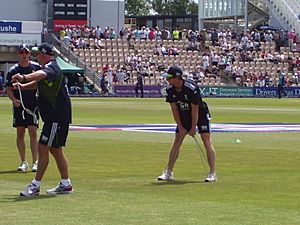
However, his form dropped after Lord's. He struggled with the bat for the rest of the series. His catching also seemed to be affected. He dropped three chances on the final day of the series. But he did take a sharp catch that helped England win the match and the series 2–1.
In November 2009, Collingwood played his 171st ODI match against South Africa. This meant he had played more ODIs than any other England player. He held this record until May 2019.
Later Career and Retirement
In early 2010, Collingwood led the England Twenty20 team to win the 2010 World Twenty20 championship. He played in all seven games. He didn't score many runs, but his leadership was highly praised. He led England to their first-ever ICC trophy. He hit the winning runs in their victory over Australia in the final.
Collingwood was rested for the home Test series against Bangladesh. But he returned for the ODI series against Australia in June. In the second match, he became England's all-time leading run-scorer in ODI cricket. After poor batting in the 2010–11 Ashes series, he announced his retirement from Test cricket.
For his great performances in 2010, the ICC named him in the World ODI XI. In July 2014, he played for the Rest of the World team at Lord's. In August 2017, he played for a World XI team in three Twenty20 International matches against Pakistan.
Coaching Career
After retiring from playing international cricket, Collingwood became a coach. He worked with the England and Scotland cricket teams. In November 2014, he joined Scotland's coaching staff for the 2015 Cricket World Cup. He then became the captain/assistant coach of Durham. He helped them win the 2013 LV County Championship and the 2014 Royal London One-Day Cup.
Collingwood was named Limited Overs Consultant for England in September 2015. He was also appointed as the fielding coach for the England cricket team. On February 7, 2022, it was announced that Collingwood would be the temporary head coach for the men's England cricket team. This was for the upcoming Test series in the West Indies.
Achievements and Awards
Collingwood was chosen as one of the five Wisden Cricketers of the Year in 2007. This is a very important award in cricket. Wisden said he was a player who made the most of his skills and always wanted to get better.
Test Match Highlights
- He scored over 1,000 Test runs in one year (2006).
- He set an England record for a fourth-wicket partnership against Australia. He scored 206 runs in a 310-run partnership with Kevin Pietersen in 2006.
- He scored a double century against Australia in 2007. He was only the third English batsman to score a double century in Australia.
- He was the first Durham player to score a Test century for England. He was also the first to hit one at Riverside Ground.
One-Day International Highlights
- He had the best bowling figures in an ODI by an England player. He took 6 wickets for 31 runs against Bangladesh in 2005.
- He had the best all-round performance in an ODI. He took 6 wickets for 31 runs and scored 112 runs without being out against Bangladesh in 2005.
Twenty20 International Highlights
- He was the first English cricket captain to lead a major ICC tournament-winning team.
Images for kids
See also
 In Spanish: Paul Collingwood para niños
In Spanish: Paul Collingwood para niños
 | Stephanie Wilson |
 | Charles Bolden |
 | Ronald McNair |
 | Frederick D. Gregory |


